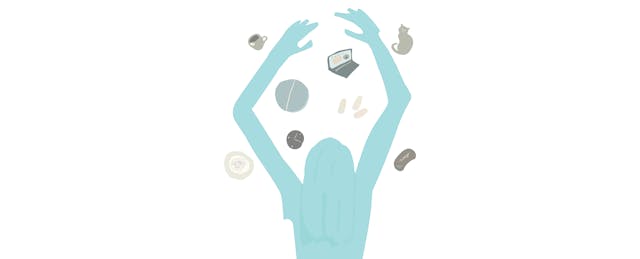College is hard enough to pay for even in the best of times—let alone a pandemic.
Social distancing measures are saving lives. But there’s widespread economic pain with waves of businesses laying off workers. And that has severely challenged the finances of many college students. Even for those who can pay the bills, their bleak job prospects after graduation stirs anxiety as many students carry heavy student loan debt.
How does that financial stress impact students’ studies, and what should educators know about these financial realities? On this week’s podcast, we talk to two students facing these challenges as part of our series about how COVID-19 is impacting education.
Listen to this week’s episode on Apple Podcasts, Overcast, Spotify, Stitcher, Google Play Music, or wherever you listen to podcasts, or use the player below. Or read the partial transcript, which has been lightly edited for clarity.
“My dad is a professional juggler for a living. He rides a unicycle. He juggles fire, he walks on stilts—all of that,” says an undergraduate at the University of Texas at Austin, who asked not to be named because he shared sensitive details about his family and finances. “The nature of being in the entertainment industry is that there’s events, and so all of his work is canceled” because of COVID-19.

This week’s podcast sponsor is Emporia State University’s online Elementary Education program: designed for career changers interested in becoming elementary teachers.
Know anyone who might be a good fit? Let us know here.
He first went back to Houston, but found his home environment too stressful to focus on his schoolwork “because there was a lot of financial stress and yelling.”
He discovered that he could get a partial refund when he broke his housing contract at a housing co-op where he had pre-paid for the full semester. Then he moved into the vacant apartment of a friend who had gone back home. Now, part of his student aid checks go to helping support his parents.
This scholarship student had won distinction for his academic work in the past. Now, though, he has trouble focusing on the work sent to him by his professors now that the university shifted to remote learning. “I’m under a routine where one day I will work and do my assignments, and then the next day I’ll rest,” he says. “There was a two- or three-day period where I just felt so overwhelmed, I wasn’t eating like much at all. And then it just felt like, if I can’t eat, how am I going to complete my assignments?”
This student has a piece of advice for professors during this time.
“I think a lot of professors are very distant from people who have experienced poverty, and might not understand just the sheer stress that [it] can put on someone on a day-to-day basis. So I would just hope that professors would not [give failing grades] during this time, or just be extremely flexible with deadlines. Because the lower you are on the socioeconomic spectrum, the harder it is to focus during this time.”
Debt Loads Loom
Before COVID-19 hit, one of the biggest stories we were covering was the student debt crisis in the U.S. In fact, in January—just a couple months ago—we did an episode of this podcast about student debt and how rising college costs are changing middle-class life.
For that episode, I interviewed Daniel Cueto, who took out six-figure debt to go to college at New York University. He’s now a graduate student at the University of Minnesota. I wanted to see how Daniel was doing now that the world suddenly changed.
I’m happy to say he’s healthy and safe. He’s studying remotely and doing his research.
But how is he thinking about all that debt that he still has to eventually pay off?
“My debt is something that I think of frequently—basically almost every day,” says Cueto. “But the gravity of the situation and how far-reaching the economic ramifications are going to be has actually been a source of peace and calm,” he says. In other words, because the impact is so widespread, he thinks it is likely to bring systemic changes, and he knows he’s not alone. “This is a moment that’s really exposing kind of the fault lines of our economy and where the inequities really lie,” he says.
But he does worry about what the job market will be like after he finishes graduate school and looks for a job as a professor. “I have friends in academia who are really concerned about the prospects of the job market and how there are several [jobs] that were open for new hires that are now closed.”
Having seen some of the undergraduates he works with struggling to find the technology they need to complete their studies, Cueto also knows that many people are facing immediate financial concerns. So he’s counting his blessings.
“I’m fortunate enough to have an apartment with wifi, with my own quiet space,” he says. “So I consider myself lucky.”
This is a brief recap. To hear the voices (this story works better as audio), listen to the podcast episode.


